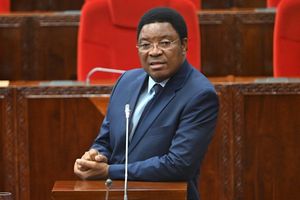CRDB Bank celebrates 100days of improved liquidity

The Minister for Finance and Planning, Dr Mwigulu Nchemba, Bank of Tanzania (BoT) Deputy Governor, Dr Bernard Kibese (first left), CRDB Bank’s Board of Directors chairman, Dr Ally Laay (first right) and CRDB Bank Group CEO, Abdulmajid Nsekela in a group photo after attending a Financial and Investment Literacy Seminar held at the Arusha International Convention Center (AICC). The seminar was organized by the bank for its shareholders and took place May 21, 2021.
The first 100 days of President Samia Suluhu Hassan in the office, have had a monumental positive impact on the operations of commercial banks, thanks to her resolve to improving liquidity in the economy.
As soon as she had ascended to power, President Hassan was categorical that there had been complaints of a slowed down liquidity in the economy.
It seems, therefore, that she had to hit the ground running in an endeavor to bring money back into circulation.
So when she addressed workers at the CCM Kirumba Stadium in Mwanza on May 1, 2021, she promised that her government would take measures to reduce the tax burden to Tanzanians and businesses.
She also promised that her government would come up with various measures aimed at improving the welfare of workers for the 2021/22 financial year.
On May 1, President Samia touched the hearts of workers by announcing reduction of income tax (Pay-as You-Earn) from the existing 9 to 8 percent.
She also said the government will promote between 85,000 and 91,000 workers in the 2021/22 financial year, a measure that would see it paying at least Sh449 billion.
The government, President Samia said, also intends to pay arrears of salaries worth Sh60 billion, changes in staffing structures that will cost about Sh120 billion as well as recruit 40,000 new workers at a cost of Sh339 billion.

The Minister for Finance and Planning, Dr Mwigulu Nchemba, Bank of Tanzania (BoT) Deputy Governor, Dr Bernard Kibese (first left), CRDB Bank’s Board of Directors chairman, Dr Ally Laay (first right) and CRDB Bank Group CEO, Abdulmajid Nsekela in a group photo after attending a Financial and Investment Literacy Seminar held at the Arusha International Convention Center (AICC). The seminar was organized by the bank for its shareholders and took place May 21, 2021.
These promises had since been brought to Parliament for approval through the national budget for the financial year 2021/22. For CRDB Bank Plc, the measures had been long over-due.
“When you reduce the tax burden, you raise workers’ take home pay. When people have money, their purchasing power improves so when they purchase various products in the economy, manufacturers’ profitability improves. When manufacturers have money, they will find it easy to repay bank loans,” said the CRDB Bank Group CEO, Abdulmajid Nsekela.
Apart from getting assured of timely repayment of loans, an economy where companies were making good business was also a boon to commercial banks in several other ways.
“When investors do their businesses profitably, they look for ways to expand their ventures and look up to banks for further capital injection that will see them doing business for a long time,” he said.

The Minister for Finance and Planning, Dr Mwigulu Nchemba (centre seated), Bank of Tanzania (BoT) Deputy Governor, Dr Bernard Kibese (second left) in a group photo with members of the CRDB Bank’s Board of Directors, Management and some of its shareholders.
With expansion, the working population in the economy will increase and so will be the number of new accounts in commercial banks.
An economy where people have money ensures that farmers’ produce will be sold at better prices. It was within the same wavelength that Finance and Planning Minister, Dr Mwigulu Nchemba, said during CRDB Bank Plc’s Annual General Meeting (AGM) in Arusha that his ministry would meet top executives of financial institutions in an effort to dis-cuss issues that would further boost lenders’ involvement in the economic wellbeing of Tanzanians.
“The President wants to see more money in circulation. My Ministry and the Bank of Tanzania (BoT) will sit down with financial institutions and see areas that were discourage people from going for bank loans which is the best way to boost liquidity,” he said.
In an effort to live up to her pledge of boosting liquidity in the economy, President Samia approved the disbursement of Sh500 million for every constituency two weeks ago. Revealing the news in Parliament was the Minister of State in the President’s Office (Regional Administration and Local Government), Ummy Mwalimu who said the money was meant to renovate roads under the Tanzania Rural and Urban Roads Agency (Tarura).

CRDB Bank Director of Corporate Affairs, Tully Mwambapa speaks during a Financial and Investment Literacy Seminar organized by the bank for its shareholders and other Tanzanians. The seminar took place at the Arusha International Convention Center (AICC) on May 21, 2021.100
“The President has listened to your cries and for the first time, we have received a total of Sh172 billion from the Consolidated Fund. Since we have received the funds early and just shortly after receiving the approval of the Parliament’s Budget Committee, we are disbursing Sh500 million to every constituency for Tarura,” she told the Parliament recently.
The decision was aimed at improving rural roads to boost agricultural productivity. The other liquidity boosting initiative that will have an impact on Tanzania and the entire business community, is the decision by the government to spend a total of Sh10.67 trillion on servicing the national debt and other related services during the 2021/22 financial year.
By servicing debts, the government will be filling the bank accounts of its service providers to enable them to remain in business and employ more and more people.


